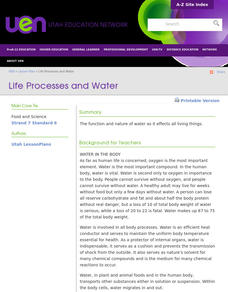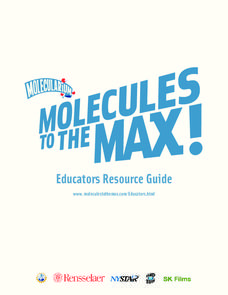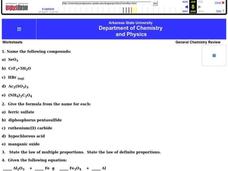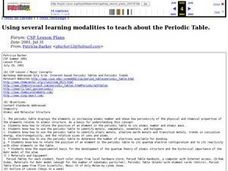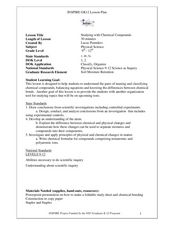Curated OER
Losing and Gaining Electrons
In this electron learning exercise, high schoolers read about how atoms lose and gain electrons and how they become ions. They are given a table with nine elements and they give the electron configuration, the number of electrons, the...
Curated OER
Life Processes and Water
Explain the properties of water. Identify the properties of water that make it a polar molecule Describe hydrogen bonds and how they differ from covalent bonds Discuss the differences between hard water and soft water Compare the heat of...
Curated OER
Metals vs. Non-Metals: Dot Diagrams; Ions
In this metals, non-metals, dot diagrams and ions learning exercise, students read about each of these topics and they identify if 8 elements are metals or non-metals, they draw electron dot diagrams for 5 elements, they write the charge...
Curated OER
Metals vs. Non-Metals
In this elements worksheet, students compare and contrast the characteristics of metals and non-metals. Students practice drawing Lewis dot diagrams and writing ion notation. This worksheet has 9 word problems, 8 matching questions, and...
Curated OER
African-American Iowans: History, contributions & Accomplishments.
Students explore lives of African-Americans in Iowa. Students will examine biographies and discuss perspectives of African-Americans. They will then create posters illustrating elements of those lives finally, putting on a five act play...
Curated OER
Physical Science Quiz
Test your class with a physical science quiz. Learners explain chemical processes, name compounds, write formulas for chemical compounds, balance equations, and more.
Rensselaer Polytechnic Institute
Molecules to the Max!—Educators Resource Guide
From molecules to nanotubes, an engaging unit explores the world of tiny science. Fifteen hands-on experiments and lessons engage young scientists as they learn chemistry. Discussions, worksheets, and data analysis reinforce the concepts...
Royal Society of Chemistry
Halide Ion Tests
Young chemists love it when colorful solid products appear in a reaction vessel! Scholars discover the products that form during halide ion tests through a hands-on activity. Users go online and apply chemistry knowledge and reasoning...
Curated OER
Enthalpy Calculation Worksheet
In this enthalpy worksheet, students calculate the combustion for propane and find the enthalpy of the reaction. They discuss entropy and free energy.
Curated OER
Edible Atom/Molecule
Upcoming chemists construct atom or molecule models out of candy. This is a classic idea that learners really enjoy; however, this lesson plan is vague. There is no instruction about the structure of atoms or molecules. Make sure you...
Curated OER
Doing Lewis Dot Diagrams
Students observe the periodic table and draw the Lewis Dot Diagram. In this investigative lesson students construct information on several elements including the Lewis Dot Formation and take a quiz on the information they learned.
Curated OER
Electronegativity
Young scholars identify the type of bonding between two atoms of elements given their electronegativity values. They study the trend of electronegativity across the periodic table in small groups.
Curated OER
Molecular Models
In this molecular formula worksheet students fill in a table describing elements and chemical formulas. They identify, elements by type and how they bond. The student analyze molecular formulas to identify the number of atoms and if the...
Curated OER
Combining Atoms
In this atoms worksheet, students explore the different types of bonds, name compounds, and determine charges of molecules. This worksheet has 8 true or false, 9 fill in the blank, and 5 short answer questions.
Curated OER
Liquids and Solids
Students describe the properties of solids and liquids, and explain how a semiconductor works. In this atom lesson students demonstrate the bonding properties of carbon and silicon.
Curated OER
Periodic Trends
Students explore the rationale behind the arrangement of the elements on the Periodic Table. Using internet and traditional research, students compare and contrast the properties of elements on the periodic table to determine a...
Curated OER
Understanding Oxidation Numbers
Students review atomic numbers, positive and negative charges, and the periodic table. They examine the relationships among protons and electrons, location of various elements, electron energy levels, and oxidation numbers.
Curated OER
Chemical Compounds
In this chemical compounds learning exercise, students write the name of compounds from their chemical formula, balance equations, write electronic configurations for elements, and draw Lewis dot structures. This learning exercise has 8...
Curated OER
Naming Compounds
In this naming compounds instructional activity, students are given a chart to determine if the compound they are naming is ionic, covalent or polyatomic. Students practice identifying and naming ionic, covalent and polyatomic compounds....
Curated OER
Chemical Formulas Unit-Day 4
The purpose of this lesson plan involves reviewing nomenclature and molecular
formulas as well as introducing naming molecular compounds and identifying acids. The students investigate and understand how conservation of energy
and matter...
Curated OER
Using several learning modalities to teach about the Periodic Table.
Students identify how to relate the position of an element in the periodic table to its atomic number and atomic mass. They identify how to use the periodic table to identify metals, semimetals, nonmetals, and halogens, and also,...
Curated OER
Art Nouveau
Students study the design elements of Art Nouveau, its sources and development. They create art projects in ceramics and glass that exemplify the focus of Art Nouveau as a decorative style.
Curated OER
Conservation: California Quarter Reverse
Students examine the California quarter reverse and discuss conservation measures. They discover the concept of conservation by a snack-eating experimen and relate it to John Muir's conservation interests. After evaluating the design...
Curated OER
Studying with Chemical Compounds
Students create a foldable to help them remember topics on chemical compounds. In this physical science lesson plan, students differentiate ionic and covalent compounds. Given certain compounds, they identify whether it's ionic or covalent.



